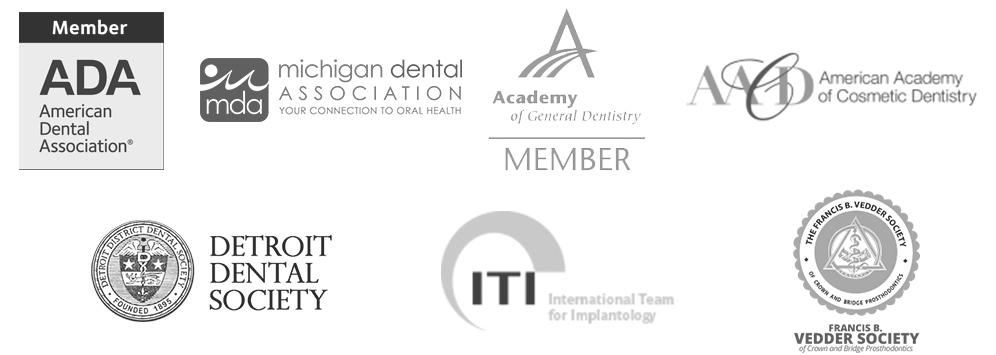Supplemental Procedures for Dental Implant Success
Are you interested in dental implants but aren’t quite the perfect candidate for the procedure? Our Farmington Hills, MI dentist, Dr. Roman Shlafer offers effective supplemental procedures to enhance your candidacy for dental implants. From bone augmentation to soft tissue grafting, these additional procedures can have a major impact on the overall success of dental implant treatments.
If you’re interested in supplemental procedures for successful dental implants, contact Dr. Shlafer by calling (248) 720-5618.
What Are Supplemental Procedures?
Supplemental procedures are extra treatments done alongside the main dental procedure to make sure it goes well. These additional steps could include things like preparing the area, providing extra support, or making improvements to get the best results. These extra steps are tailored to the needs of the patient and the dental treatment they’re receiving or hoping to receive.
Benefits of Supplemental Procedures
Supplemental procedures provide a wide array of benefits, not just for implant placement, but for the overall health and aesthetics of your smile. Some benefits include:
- Improved Implant Stability: Gum grafting & bone grafting contribute to the stability of dental implants, reducing the risk of movement or displacement.
- Comfortable Integration: By minimizing gum recession, gum grafting enhances the comfort and natural feel of dental implants.
- Harmonious Gumline: The procedure ensures a seamless and natural gum line around dental implants, enhancing overall aesthetic outcomes.
- Stability Enhancement: Ridge augmentation creates a strong and stable foundation, optimizing the long-term success of dental implants.
- Improved Bone Structure: The procedure enhances the jawbone’s structural integrity, providing better support for dental implants.
- Preserving Jawbone Density: Socket preservation prevents bone loss after tooth extraction, maintaining the density and volume of the jawbone.
- Reduced Risk of Complications: Supplemental procedures contribute to minimizing potential complications, promoting the overall health and longevity of dental implants.
Types of Supplemental Procedures
Tooth Extraction
Tooth extraction may be necessary due to severe decay, or damage, or to make space for orthodontic treatment. Dr. Shlafer uses specialized instruments to gently loosen the tooth and then extract it. After extraction, your Farmington Hills dentist may recommend options for replacing the missing tooth, such as dental implants, bridges, or dentures.
Gum Grafting
Gum grafting can treat gum recession by adding gum tissue to areas where it has pulled away from the tooth. This can help reduce tooth sensitivity, protect the tooth roots, and enhance the overall appearance of the smile. The graft tissue is usually taken from another part of the mouth or a tissue bank. Gum grafting promotes gum health and restores a more balanced and aesthetically pleasing gumline.
Bone Grafting (Ridge Augmentation and Socket Preservation)
Bone grafting helps restore or augment bone in the jaw. During the procedure, your Farmington Hills implant specialist places graft material—typically sourced from the patient’s own body, a donor, or synthetic sources—into the targeted area of the jaw. This graft serves as a scaffold, encouraging the natural growth of new bone cells. Types of bone graft procedures include socket preservation, ridge augmentation, and sinus lifts.
Ridge augmentation is a bone grafting procedure performed to rebuild and reshape the jawbone after tooth loss, preventing the bone from collapsing or becoming uneven. This helps create a solid foundation for dental implants or enhances the appearance of the jawline.
Socket preservation is a type of bone grafting done at the time of tooth extraction to prevent bone loss. After removing a tooth, the empty socket is filled with graft material, typically made of bone particles. This promotes healing and maintains the structure of the jawbone, making it more conducive for future dental implant placement.
A sinus lift, or sinus augmentation, is a surgical procedure that increases the amount of bone in the upper jaw, specifically the premolars and molars. This procedure is often necessary when the sinuses are too close to the jaw for dental implants to be placed securely.
Who Qualifies for Supplemental Dental Procedures?
Qualification for supplemental procedures depends on the specific needs and oral health conditions of the patient. Your implant dentist will determine your eligibility for these procedures based on various factors, including:
- Individuals with severely decayed, damaged, or impacted teeth.
- Patients with gum recession, exposing tooth roots and causing sensitivity.
- Patients who have experienced bone loss after tooth extraction or have an uneven jawbone.
- Individuals with insufficient bone height in the upper jaw, particularly in the premolar and molar regions.
Frequently Asked Questions
No, supplemental procedures are not always necessary before dental implant placement, as their requirement depends on individual factors such as bone density and gum health. When there is sufficient bone volume and no significant challenges, dental implants can be placed without supplemental procedures. If issues like inadequate bone volume exist, procedures like bone grafting or sinus lift may be recommended to optimize implant stability and success.
Coverage for supplemental procedures by insurance varies and depends on the policy and the reasons for undergoing the procedures. Certain supplemental procedures may be partially covered if they’re deemed medically necessary to support dental implant placement. Patients are advised to check with their insurance provider to understand the extent of coverage for supplemental procedures and discuss any potential out-of-pocket costs.
Pain levels and recovery times vary depending on the specific supplemental procedure. Dentists will discuss potential discomfort and provide post-operative care instructions to ensure a smooth recovery.
The time frame varies based on graft extent. In some cases, implants may be placed just months after grafting. Other cases require longer healing first. Your dentist will assess your needs at your initial consultation.



